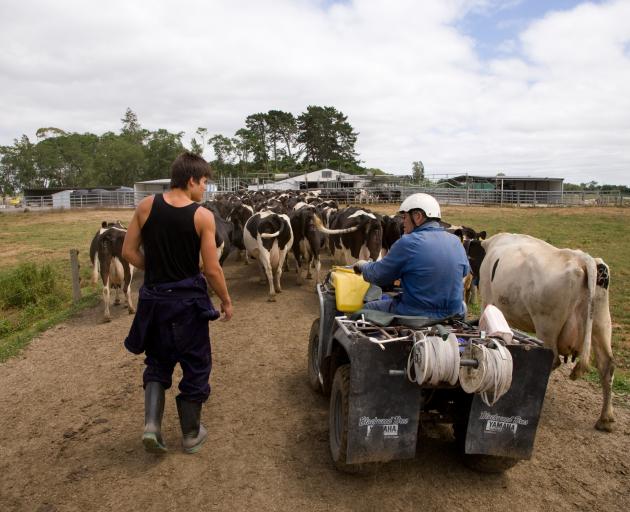
At this time of year, most farmers were calving, and spent their time trying to get through the busy period with whatever staff they had, he said.
But at the end of calving and in the coming month, the pressure would build for farmers and there was a high risk of some burning themselves out, he said.
''Amongst other tasks in addition to calving, farmers will also be juggling milking, moving dry stock, raising calves and managing pasture.''
While DairyNZ, along with Venture Southland, was trying to combat the shortage of staff in the sector, more changes to immigration earlier this year were making it even harder to find and retain good staff, Mr Kyte said.
The dairy industry employs about 35,000 people on-farm nationwide, including contractors and staff.
About 3800 jobs are filled by people from overseas.
''Finding good staff continues to be a real issue for dairy farmers, and the hoops they have to go through to employ migrant staff - and then try to retain them - adds a whole lot more pressure,'' Mr Kyte said.
Earlier this year, the Government announced changes to immigration policy. Under these, some dairy staff are classified as lower-skilled, which means unless they are paid as much as $35.24 an hour, they will be on a yearly review.
The new requirement means herd managers and farm assistants on work visas would have their visas renewed every year, and they would have to leave the country after three years.
Earlier this year, DairyNZ and Venture Southland completed a survey of dairy farm staff in the Southland region that clearly showed the scale of the staff shortage and pointed to the urgency of getting it resolved, Mr Kyte said.
''With the findings and information from a number of other government agencies, including Immigration New Zealand, DairyNZ is working with Venture Southland to pull together what is a compelling picture of the serious situation being faced by farmers desperate for staff.''
This will go in front of the Government shortly.
DairyNZ had also begun conversations with Work and Income New Zealand to get a better fit for farmers with the clients they were offering, Mr Kyte said.
In an attempt to attract more people to the sector, DairyNZ and Federated Farmers had developed the Sustainable Dairying Workplace Action Plan, to help dairy businesses adopt good workplace management practices, Mr Kyte said.
''Farmers are wholeheartedly committed to lifting the quality of the farm working environment. They know that balanced working hours, fair remuneration, wellness, wellbeing, and health and safety all contribute to achieving effective team cultures, rewarding careers - and, of course, profitable farming businesses.''
The rules
- Changes to Immigration that came into force on August 28:
- The introduction of remuneration bands to determine the skill level of an essential skills visa holder, which would align with the remuneration thresholds being introduced for skilled migrant category applicants.
- The introduction of a maximum duration of three years for lower-skilled essential skills visa holders, after which they will need to spend 12 months outside New Zealand before they can be granted an essential skills visa to work in another lower-skilled role.
- Requiring the partners and children of lower-skilled essential skills visa holders to meet the requirements for a visa in their own right (they will still have access to short-term visitor visas).
- Exploring which occupations have a seasonal nature and ensuring the length of the visa aligns with peak labour demand.
